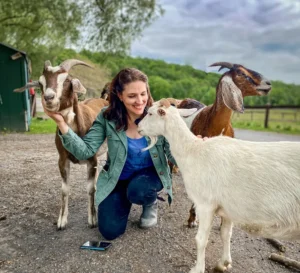ANIMAL SANCTUARY SEARCHING FOR NEW HOME

Farm animals once destined for the slaughterhouse are getting a new lease on life at Catskill Animal Sanctuary (CAS).
Its founder, Kathy Stevens who hails from Virginia and was raised on a horse farm, founded the sanctuary in 2001. Starting with a 78-acre parcel tucked away on a quiet dead-end road in Ulster County’s town of Saugerties, CAS added six more adjoining parcels to the original property over the next two decades and now it totals 150 acres.
Stevens, who taught English for several years in Boston before relocating to the Hudson Valley, decided to put her love of learning into animal husbandry and to encourage visitors to think of better food choices when it comes to eating.
Stevens and her staff of 26 live full time at the sanctuary and volunteers from the surrounding area have helped keep the animals and the property up to speed, though Stevens says it’s difficult to raise and graze animals properly on land that has flooded several times, taking with it many of the shade trees that once gave relief to both animals and employees in the fields. Now, she hopes to sell off the parcels individually and relocate the sanctuary to higher ground.
Stevens said climate change has made has made the property tough to manage and it doesn’t seem likely it will get better. “We’re in a valley and have had extreme erosion, tree loss and lots of flooding, leaving staff tasked to move animals from place to place, where they can graze properly and have shade in warm weather. We’ve spent a great deal of money on mitigating flooding problems but are still dealing with them, nonetheless…we have pastures turning into rocks…the board has been in talks since 2017 about relocating but we don’t want to wait any longer.” Stevens says she and her Board of Directors are hunting for a new home for the sanctuary as close to the original site as possible. “It’s convenient for our visitors and volunteers who come from New York City, Connecticut and New Jersey to visit.”
The four-legged residents of the sanctuary help educate visitors, as well as volunteers, on making better food choices, said Stevens, since she does not consider farm animals raised for the dinner plate a healthy food choice because of the antibiotics and other hormones they are fed. “That’s the other half of our mission: to promote veganism so people can learn the impact on their health of eating meat,” the CAS founder said.
Stevens said Covid 19 lockdowns have severely impacted the sanctuary’s income streams, a situation familiar to many other sanctuaries around the tri-state area that rely on visitors and programming for income. “A survey was recently conducted on 45 sanctuaries throughout the country,” said Stevens. “Ninety-three percent are extremely concerned about their sustainability. It is a challenging time for us.” While CAS works to reach its goal of selling off the sanctuary’s current properties and relocating to a new grazing haven for their animals, Stevens remains upbeat. “I believe most people are inherently good, and seeing what we do at the sanctuary draws out the best in them.” Stevens also hopes it will encourage people to make healthier food choices as well.